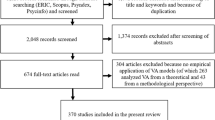Abstract
The Tennessee Value-Added Assessment System determines the effectiveness of school systems, schools, and teachers based on student academic growth over time. An integral part of TVAAS is a massive, longitudinally merged database linking students and student outcomes to the schools and systems in which they are enrolled and to the teachers to whom they are assigned as they transition from grade to grade. Research conducted utilizing data from the TVAAS database has shown that race, socioeconomic level, class size, and classroom heterogeneity are poor predictors of student academic growth. Rather, the effectiveness of the teacher is the major determinant of student academic progress. Teacher effects on student achievement have been found to be both additive and cumulative with little evidence that subsequent effective teachers can offset the effects of ineffective ones. For these reasons, a component linking teacher effectiveness to student outcomes is a necessary part of any effective educational evaluation system.
Similar content being viewed by others
References
Graphical Summary of Educational Findings from the Tennessee Value-Added Assessment System (TVAAS), 1995. (1995). Knoxville: University of Tennessee Value-Added Research and Assessment Center.
Jordan, H.R., Mendro, R.L., & Weersinghe, D. (1997). Teacher effects on longitudinal student achievement: A preliminary report on research on teacher effectiveness. Paper presented at the National Evaluation Institute, Indianapolis, IN.
McLean, R.A., & Sanders, W.L. (1984). Objective component of teacher evaluation: A feasibility study. Working Paper No. 199. Knoxville: University of Tennessee, College of Business Administration.
Sanders, W.L., & Rivers, J.C. (1996). Cumulative and residual effects of teachers on future student academic achievement. Research Progress Report. Knoxville: University of Tennessee Value-Added Research and Assessment Center.
Sanders, W.L., Saxton, A.M., & Horn, S.P. (1997). The Tennessee Value-Added Assessment System (TVAAS): A quantitative, outcomes-based approach to educational assessment. In Millman, J. (ed.), Grading Teachers, Grading Schools, Thousand Oaks, CA: Corwin Press.
Sanders, W.L., Saxton, A.M., Schneider, J.F., Dearden, B.L., Wright, S. Paul, & Horn, S.P. (1994). Effects of building change on indicators of student academic growth. Evaluation Perspectives, 4(1) pp 3 and 7.
Wright, S.P., Horn, S.P., & Sanders, W.L. (1997). Teacher and classroom context effects on student achievement: Implications for teacher evaluation. Journal of Personnel Evaluation in Education, 11(1), 57–67.
Author information
Authors and Affiliations
Rights and permissions
About this article
Cite this article
Sanders, W.L., Horn, S.P. Research Findings from the Tennessee Value-Added Assessment System (TVAAS) Database: Implications for Educational Evaluation and Research. Journal of Personnel Evaluation in Education 12, 247–256 (1998). https://doi.org/10.1023/A:1008067210518
Issue Date:
DOI: https://doi.org/10.1023/A:1008067210518




